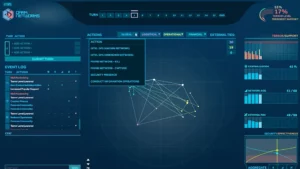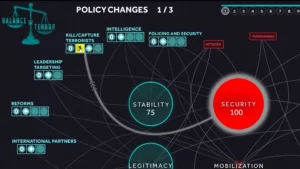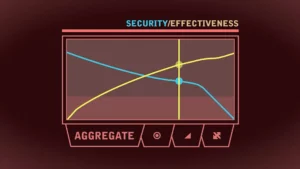Overview
CounterNet, Balance of Terror and Dark Networks are strategic games, developed by ICT, with funding from the Naval Postgraduate School (NPS), for the George C.Marshall European Center for Security Studies as part of their Program on Cyber Security Studies (PCSS) core curriculum.
Summary: Dark Networks
Dark Networks is a strategic game, for two-players (state vs terrorist), focusing on the organizational structure of terrorist groups and how these structures can be altered to make the terrorist group more or less effective. It reinforces ideas from the field of social network analysis (SNA): nodes and links, and the importance of size, centrality, and external ties.
Each player may have a strategy to defeat the other, but they must adapt their strategies over time to maximize their advantages. The core tradeoff in this game is between security and effectiveness for the terrorist group. Measures taken to increase effectiveness (growing, centralizing) will diminish the terrorist group’s security, and vice versa. This forces players to think about which attribute (security or effectiveness) they wish to maximize. This will change depending on the timing in the game and players’ strategies.
This game highlights the dilemmas of a state operating with incomplete information and limited options.
Summary: Balance of Terror
Balance of Terror is a two-player strategic game of terrorism and counterterrorism. Nothing comes easy for either side, with both players facing difficult tradeoffs. The state must protect its citizens (stability), but cannot overreact and lose the support of the people (legitimacy). The state is also financially constrained, with limited resources (budget) to spend each turn, and a reserve fund of unspent resources from previous turns (bank). The terrorist, meanwhile, must grow its organization (mobilization), while protecting existing members (security). The terrorist also has a budget for each turn plus a bank of unspent resources. The state player wins if the terrorist’s security or mobilization drops too low, while the terrorist wins if the state’s stability or legitimacy drops too low.
Summary: CounterNet
CounterNet is a single-player, web-based counter-terrorism game that teaches how to identify, track, counter and thwart online terrorist activity. A player takes on the role of a government professional trying to prevent an attack by a fictional eco-terrorist group called Terala. The player must prevent Terala from utilizing platforms for social media (X/Twitter, Instagram, Vine), content creation and dissemination such as Youtube, payment systems (e.g. Paypal) and email.
The game centers around 10 fundamental uses of the internet that cyber-terrorists can exploit to their advantage:
- Propaganda
- Financing
- Training
- Planning
- Execution
- Recruitment
- Incitement
- Radicalization
- Public Information
- Secret Communication
Learning Objectives include:
- Knowing when and how to take action and how to mobilize the broader society
- Understanding tradeoffs and costs (2nd and 3rd order effects) that need to be anticipated and managed
- Learning how to work alongside other government organizations, the private sector and the international community
Next Steps
All three games are now part of the Global Ecco suite of online games at the Naval Postgraduate School (NPS) and continue to be used by a broader audience of cyber-security professionals and students.


